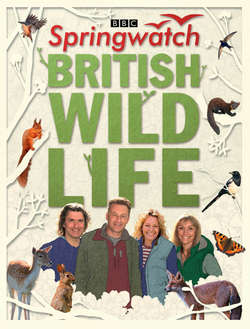Читать книгу Springwatch British Wildlife: Accompanies the BBC 2 TV series - Stephen Moss - Страница 27
ОглавлениеSkylark
©Robert Canis/FLPA
The skylark may have a rather dull brown plumage but it has one of the most memorable songs of any British bird.
Some birds are inextricably linked with a particular kind of habitat: gannets with offshore islands, robins with gardens, and mallards with park ponds. But surely no bird is quite so closely tied to the place where it lives than the skylark. This is the quintessential farmland bird, spending most of its life in and around our arable fields.
And yet the skylark also lives in another, very different, habitat. Perhaps habitat is not quite the right word, for I am referring to the place the skylark has made its own: the sky. No other bird sings for quite so long, quite so persistently, and quite so high in the air. For hours on end, you can hear them, though sometimes you will struggle to see one, so high does it fly.
When your eyes finally settle on a tiny, dark speck, appearing to bounce up and down on an invisible piece of elastic, you may well doubt that it is a bird at all. Only when you watch as it drops like a stone, descending through the air on folded wings until it reaches the ground, is its identity confirmed. Should you then follow it to try to find its nest, you are unlikely to do so; skylarks are well known for landing some distance from their actual nest site, then running unseen through the long grass to reach it, thus foiling any watching predators.
Why skylarks choose to sing in the air for so long is the result of two factors: lack of competition (only the meadow and tree pipits even try to match it, and not for long), and an evolutionary arms race in which the birds that sang for longest, and most persistently, would win the attentions of the females. They then passed on their ability to their own offspring, and so the habit developed.
Recent studies have revealed another extraordinary aspect of the skylark’s behaviour. When confronted by a predator such as a merlin, experienced skylarks will sing louder, as if daring the falcon to do its worst and attack them. Less experienced birds often give in to their fear, stop singing and try to escape, at which point they are chased and caught by the merlin.
The skylark’s extraordinary song flight means that it has been justly celebrated in literature and music. The nineteenth-century poet George Meredith wrote his famous poem The Lark Ascending with the verse and rhythm mimicking the bird’s flight. The poem later inspired an equally memorable piece of music by the composer Ralph Vaughan Williams. Shelley, too, celebrated the bird in his famous ode To a Skylark with the opening lines ‘Hail to thee, blithe spirit! Bird thou never wert’.
Sadly, the song that inspired these great works of art is now rarely heard across great swathes of the British countryside. More than two million pairs of skylarks – about half the total numbers – have disappeared in the past 50 years because modern farming methods are incompatible with these birds’ complex needs.
Skylarks need a range of different ‘mini-habitats’ if they are to thrive. These include short, cropped grass, for feeding; patches of longer grass, where their nests will be safe from predators; and, most importantly of all, stubble fields packed with weed seeds, where they can feed during the winter months. Without this mosaic of habitats, numbers of skylarks are bound to continue to fall.
If we want to get our skylarks back, it seems we have no choice. We must, as a nation, make a wholesale shift away from industrial agriculture and move back to more mixed farming, which will inevitably mean more expensive food for us as consumers. It is either that or accept that this classic bird of the countryside will continue to decline, and perhaps one day even disappear.
©Mike Powles/FLPA
Skylarks nest on the ground, making them very vulnerable to farm machinery and attack by predators.
